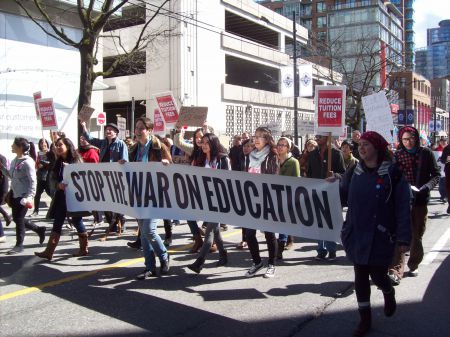STORY about Education posted on April 1, 2012 by bineshii
March to Defend Public Education
Vancouver Students Rally In Solidarity with Striking Students in Quebec
April 1st, at the Vancouver Art Rallery, a group of a few hundred mostly students gathered to support public education and in support of student stikers in Quebec.
The following is from a pamphlet picket up at the rally:
"Yes, This Is A Strike.
On the picket lines, I’ve heard the same numb recitation of “This isn’t even a strike, it’s a boycott!” repeated like a mantra, absolving one of responsibility for crossing a picket line. It seems as though disparagingly few students have taken the time to critically assess the assumptions underlying this discourse – speaking to a sad state of affairs in the university more generally. A boycott concerns consumption, and a strike production; consequently these reading represent opposing understandings of not only students and the university, but of knowledge itself.
To refer to a boycott, essentially, is to refer to students as consumers, and knowledge as a commodity that is passively consumed as a finished product. Within the idea of the boycott is the assumption that the student exchanges their tuition for a fixed body of knowledge, which is then their property.
Ironically, this runs counter to the idea, oft referred to by the same academic hacks, that university is an “investment” in knowledge-capital. For knowledge to produce value, as capital, it must be acted upon by labour – it must pass from its abstract existence and be transformed qualitatively. This process, for obvious reasons, is directly dependent on the concrete work of the student. In the course of their studies, students create a body of usable knowledge and social capital from which the university profits – when students stop going to class, this transformation of knowledge is interrupted. In other words, yes, it is a strike.
Disturbingly, foundational to all of this is the notion that knowledge exists, fundamentally, within the logic of the marketplace. It is implicit that knowledge serves first and foremost, a role within the reproduction of capital. While free market fundamentalists might argue that the interests of capital serve the greatest possible good, one might hope that university students are not so intellectually stunted. In any case, a little bit of thought should reveal the obvious, that knowledge is not a fixed quantity, and does not diminish when it is shared. On the contrary, knowledge tends toward the common, increasing as it is passed between us. In fact, it is only because of this that the university as a site of social production is even possible.
Tuition hikes mean a further erosion of this commons, ar increasing commodification knowledge, its increasing transformation into capital, and its increasing monopolization by the capitalist class. It is with the student strike, the disruption of this process, that we stand to reappropriate knowledge by and for the commons. What is at stake in tuition hikes is not only the exclusion of particular individuals from the university –it is a battle in the larger context of “austerity” wherein the capitalist Moloch, having inevitably run up against the limits of capital accumulation elsewhere, is now turning on us to fuel its fires. As workers rise up and strike across the world, students’ actions here are contextualized by global struggle. Boycott? No. A strike as in, “striking a blow”. In case it wasn’t obvious…
This Is Class War."
**Mo·loch [moh-lok, mol-uhk] noun
1. a deity whose worship was marked by the propitiatory sacrifice of children by their own parents. II Kings 23:10; Jer. 32:35.
2. anything conceived of as requiring appalling sacrifice: the Moloch of war.
Moloch was used in Allen Ginsberg's Howl (1955), to refer to a person or thing demanding or requiring a very costly sacrifice.
The site for the Vancouver local of The Media Co-op has been archived and will no longer be updated. Please visit the main Media Co-op website to learn more about the organization.
